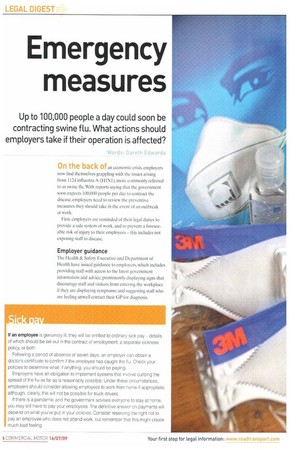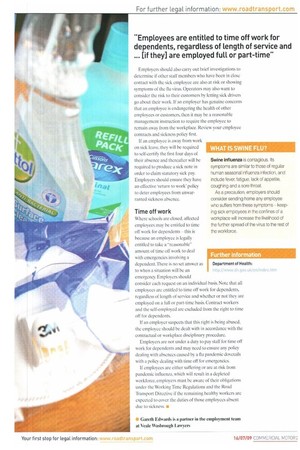Emergency measures
Page 26

Page 27

If you've noticed an error in this article please click here to report it so we can fix it.
Up to 100,000 people a day could soon be contracting swine flu. What actions should employers take if their operation is affected?
Words: Gareth Edwards
On the back of an economic crisis, employers now find themselves grappling with the issues arising from 1124 influenza A MIN!), more commonly referred to as swine flu. With reports saying that the government soon expects 100,000 people per day to contract the disease, employers need to review the preventive measures they should take in the event of an outbreak at work.
First, employers are reminded of their legal duties to provide a safe system of work. and to prevent a foreseeable risk of injury to their employees — this includes not exposing staff to disease.
Employer guidance
The Health & Safety Executive and Department of Health have issued guidance to employers, which includes providing staff with access to the latest government information and advice: prominently displaying signs that discourage staff and visitors from entering the workplace if they arc displaying symptoms: and suggesting staff who are feeling unwell contact their GP for diagnosis. Employers should also carry out brief investigations to determine if other staff members who have been in close contact with the sick employee are also at risk or showing symptoms of the flu virus. Operators may also want to consider the risk to their customers by letting sick drivers go about their work. If an employer has genuine concerns that an employee is endangering the health of other employees or customers, then it may be a reasonable management instruction to require the employee to remain away from the workplace. Review your employee contracts and sickness policy first.
If an employee is away from work on sick leave, they will be required to self-certify the first four days of their absence and thereafter will be required to produce a sick note in order to claim statutory sick pay. Employers should ensure they have an effective 'return to work' policy to deter employees from unwarranted sickness absence.
Time off work
Where schools are closed, affected employees may be entitled to time off work for dependents — this is because an employee is legally entitled to take a "reasonable" amount of time off work to deal with emergencies involving a dependent. There is no set answer as to when a situation will be an emergency. Employers should consider each request on an individual basis. Note that all employees are entitled to time off work for dependents, regardless of length of service and whether or not they are employed on a full or part-time basis. Contract workers and the self-employed are excluded from the right to time off for dependents.
If an employer suspects that this right is being abused, the employee should be dealt with in accordance with the contractual or workplace disciplinary procedure.
Employers are not under a duty to pay staff for time off work for dependents and may need to ensure any policy dealing with absences caused by a flu pandemic dovetails with a policy dealing with time off for emergencies.
If employees are either suffering or are at risk from pandemic influenza, which will result in a depleted workforce, employers must be aware of their obligations under the Working Time Regulations and the Road Transport Directive if the remaining healthy workers are expected to cover the duties of those employees absent due to sickness. ol
Department of Health:




















































































































































